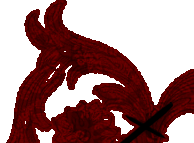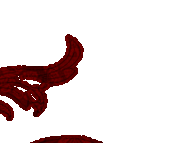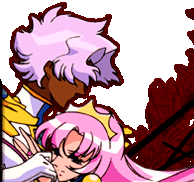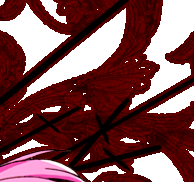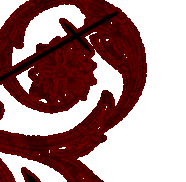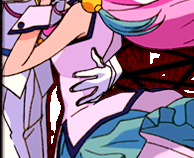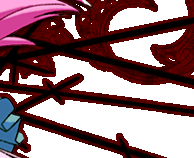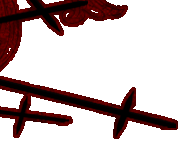
This analysis
was donated by satyreyes. 
The corruption of a Black Rose duelist begins when their connection with the one they love is threatened. Kozue visits Mikage when she perceives that Anthy is usurping the place in Miki’s heart that Kozue has always held. On a slightly more complicated but parallel line, Shiori visits Mikage when she discovers that Juri never cared for the boy she thinks she stole from her, robbing Shiori of the ability to hurt Juri that she thought kept Juri on her leash. In every case but one, a visit to Mikage’s elevator-confessional seals the visitor’s fate; he takes them down to the depths of their psyche and forces them to confront the hatred for their beloved that lives there. At this point, of course, the path before them (and to the arena) is prepared. Only one person walks out of Nemuro Memorial Hall wearing no black duelists’ ring.
Superficially, Tatsuya appears to have all the potential for corruption that Mikage’s other visitors do. He has a profound, even obsessive, love for Wakaba which is suddenly threatened when he discovers her obsessive love for Saionji. The latter of these loves leads to a convert for Mikage; why doesn’t the former? Even a casual viewer perceives, though fuzzily, that it’s because Tatsuya is in some ineffable sense too pure or innocent for Mikage. This is almost correct. A more precise understanding of Tatsuya’s unknowing invulnerability to corruption requires a look at what it means, exactly, to pull a sword out of someone.
Just before Shiori’s trip to the arena, Nanami gets some interesting lines at a seitokai meeting. She strikes up a conversation with Miki, first questioning him about his stopwatch. After he (infuriatingly) cuts off that line of questioning, she turns instead to the sword Kozue pulled out of him earlier:
Nanami: Hey, hey, by the way...
Nanami: How did it feel?
Miki: How did what feel?
Nanami: You know what I mean... Did it hurt?
At this point Miki again cuts Nanami off. But if you think there’s no sexual innuendo in that conversation, especially in the context of Kozue pulling a sword out of Miki’s torso, you need to get your mind into the gutter. As with so much else in life, it all boils down to sex. Whether you’re conscious of it or not, there’s something about the other person that arouses you, something that causes you to demand their constant and undivided attention. Keiko even says it as she pulls the sword out of Touga: “From now on, look only at me.” Above all, though, what is inside of them is some quality that you unconsciously need; and if you can’t have it, you pull a sword out of them instead.
This pattern can be seen at work easily during Mikage’s renditions of the Tower of Terror. What is it about Miki, for example, that fixates Kozue on him? It’s certainly not conscious sexual attraction; in fact, he’s possibly the only boy at Ohtori she denies herself to. What does she see when she looks at him that she finds so compelling – that she resents him having when she does not? In Miki’s case, it is the capacity for compassionate love. Kozue sees Miki treating Anthy in a way that Kozue cannot conceive of treating anyone. Unable to come to grips with her own lack of this quality, and watching Miki drift away from her precisely because of this lack, Kozue visits Mikage, and next thing she knows she’s got Miki by the hilt.
What about Juri and Shiori? Theirs is an interesting case, and probably the most complicated dynamic between a Black Rose duelist and their beloved. It goes without saying that Juri has a fixation on Shiori, and the emotional scars to prove it. What is less obvious, though it’s merely the other side of the same coin, is that Shiori has a fixation on Juri. Torturing Juri is what gives Shiori’s life meaning. As long as Juri’s heart breaks every time she thinks about Shiori, Shiori will be happy. So what is it that Shiori sees in Juri that Shiori herself lacks? A conscience. This conscience is the reason Juri has always been a downer, and the lack of it is what enables Shiori to torture her. The only thing that enables Shiori to deal with her envy of Juri’s conscience is the power to make her miserable. Shiori gained that power, she thinks, by stealing Juri’s boyfriend from her, and due to the “cruel innocence” Juri remarks upon to Utena, it has never occurred to her that Juri’s misery might have another explanation. As a result, when Juri tells her flat out “I never had any feelings for him,” Shiori gets thrown for one hell of a loop. She believes – incorrectly, of course, but she believes it – that she has lost that power over her beloved enemy, and that sends her flying into Mikage’s all-too-comforting arms.
Meanwhile, Nanami continues to use and abuse her devoted slave Tsuwabuki. He’s always been an innocent – more so, surely, than Tatsuya! So how come Tsuwabuki gets to play with Nanami’s weapon? Naturally, it’s because there’s something about Nanami he envies. Amazingly enough, what Tsuwabuki envies is Nanami’s adulthood. (Yes, I’m laughing too.) Tsuwabuki views himself as woefully immature, particularly after an unfortunate confluence of events. Nanami says he’s not mature enough to understand the Seitokai’s proceedings, he doesn’t know what Mari means when she accuses him of sexual innuendo, and even naive, virginal Utena seems so much more adult than he does. And to top it off, it’s not enough for him to be near Nanami anymore, as he tells Mikage. He needs more from her – but to get it, he needs the adulthood that she has and he doesn’t. Impatient, unable to wait to grow up, Tsuwabuki runs to the only person who can console him. Fortunately for him, after the duel he gets all that anger out of his system, finally making room for hormones.
Anger management is part of Tsuwabuki’s problem, but Wakaba has no trouble with it. Heck, does Wakaba even get angry? Saionji posts her love letter on the bulletin board for all to read and makes a fool out of her, yet when he shows up hangdog at her house she takes him in and nurtures him with no evident resentment. Gio and Yasha have written an excellent essay on why this is so – Wakaba needs to be needed, and Saionji eminently satisfies that need. But Wakaba’s lack of resentment deserves further exploration. For all her crying over Saionji’s letter, not once does Wakaba curse his name. In episode 11 she’s so proud of making Utena lunch, yet doesn’t say a word against Anthy when the latter shows up with an enormous bento. For that matter, she’s never said – out loud – that she resents all the attention of Utena’s that Anthy has diverted from Wakaba. Common sense tells us that no one with such a drive to be needed could be so blasé when she is needed no more. No wonder she’s attracted to Saionji; he’s the paradigm of self-indulgence, which in moderation is a healthy thing, since properly nurtured it contains the seeds of self-respect. That self-indulgence is why he’s able to feel and act upon resentment while Wakaba is not. It’s also why he’s needy, for instead of bringing about self-respect, Saionji’s immoderate self-indulgence has led him to require external validation for his actions, and that just makes Wakaba love him more. She loves his self-indulgence both because it makes him need her and because she lacks it. She doesn’t mind lacking it, not at first. But when (thanks to Mikage) she perceives that Saionji’s self-indulgence has led her love to leave her for another, she develops the love-hate relationship with both Saionji and his self-indulgence that invariably leads people to Nemuro Memorial Hall.
What sends Keiko, the last of the Black Rose duelists apart from Mikage himself, to seek the manipulator? She’s never been more than Nanami’s adoring lackey in the past. Indeed, many fans think Ikuhara’s selection of Keiko for the Touga Black Rose duel was something of a cop-out for lack of a better character to use. This could not be further from the truth. True, Keiko has until now been obscured, present only in Nanami’s shadow. But this is exactly what makes her the perfect King Arthur to Touga’s stone, for what Touga has that Keiko adores and despises is ambition. The reason Aiko, Keiko, and Yuuko signed on with Nanami in the first place, as we see in episode 21, is to get close to Touga. The three subsequently almost forgot this motivation, submerged in Nanami’s charisma and their own delusions of elitism. But Keiko receives a rude reawakening when Nanami ejects her from Touga’s special party. Her loyalty is divided, and when the chance comes to curry favor with Touga by offering her umbrella, she takes it. She’s exhibiting the signs of ambition here, in the form of the desire to take Nanami’s place at his side. Thanks to Nanami, that ambition is promptly squelched. It’s replaced by a combination of self-loathing and an undiminished idolization of Touga, a repulsion from ambition and an attraction to it. Naturally, she heads to Nemuro.
On an entirely unrelated note, Nanami’s henchwomen’s names are, in the usual order of their presentation, Aiko, Keiko, and Yuuko. Take off the “-ko” (“girl/child”) suffix, and you’re left with Ai, Kei, and Yuu – or, in English, I, K, and U. Let no one say that IKUhara never indulged himself in the making of Utena.
Now at last we are in a position to examine Wakaba’s Onion Prince. Tatsuya loves Wakaba as much as any Black Rose duelist loves their idol. He’s an innocent, but so is Tsuwabuki; his love is unrequited, but so is Keiko’s; his desire extends back years, but so does Kozue’s. And just like them, when his love is frustrated, he turns to Mikage for an emotional Band-Aid. So why does Mikage turn him right back around again? Why does Tatsuya, alone of all Mikage’s visitors, make the elevator turn upward, even as he rages to Mikage with as much passion as anyone else?
Well, we could take Mikage’s word for it. Tatsuya’s “a truly good person,” he says; “this is no place for someone like [him].” But that’s awfully strong, isn’t it? Is Tatsuya a truly good person? We see him try to deceive Utena to get close to Wakaba; we see him being oblivious to Wakaba’s love of her Onion Prince; we even see his initial reluctance to protect her from bullying on the playground. Wakaba says he’s promiscuous, though we have reason to doubt her sincerity; but we do know that he left Wakaba’s old school without so much as a goodbye. Even his body language during episode 19 bespeaks overconfidence and a certain self-absorption. Sure, he’s a sweet talker, but is this a “truly good” boy, and is this what halts the elevator’s inexorable descent?
Well, Tatsuya’s a human, and humans have flaws. Some flaws cover up a deep-seated feeling of repressed inadequacy, as with the true Black Rose duelists. But sometimes a flaw is just a flaw, and we have reason to think that Tatsuya has little to hide. Chu Chu, that model of judges of character, falls in love with him at first sight. Mikage never expected him to show up; he arrived at Nemuro Memorial Hall to find the foyer empty. When he realizes, by the gate, that his callousness has hurt Wakaba – that in fact she had loved him all along – his expression is one of genuine concern and apology. And – significantly – he is the only character other than Utena to be introduced with a frame of white roses.
Does this make him a truly good person? Maybe. But this much is certainly true: he doesn’t have the qualifications of a Black Rose duelist, for he doesn’t hate Wakaba even as he loves her. He doesn’t put her on a pedestal, then resent her remoteness. He wishes to confront Wakaba, not as a worshipper confronts a god, but as an adult confronts another adult: as an equal. Tatsuya has what every other Black Rose duelist lacks: true emotional maturity. He offers himself to Wakaba with no strings attached – and Mikage can’t manipulate someone with no strings to pull.
Tatsuya’s got rotten luck. Perhaps more than anyone else in the series, he deserves to be with the one he loves; but the world of Utena is not a place for normal people with no inner demons to face. Thus his beloved is already in love – with a man she’s going to have to pull a sword out of in a week’s time. By then it’s too late. Tatsuya, we presume, has left the campus, taking the path that Mikage shows to him and no one else: the one that lies outside Ohtori Academy. Like only a few others – Tokiko, Ruka, and ultimately Anthy – he has left the garden within which Akio says no one can ever grow up.
Ikuhara doesn’t forget about Tatsuya, though. We get a glimpse of him in the movie. It’s in the scene where the characters are breaking off into pairs to sketch each other. He’s paired himself off with Wakaba, and they look very happy.
 |

